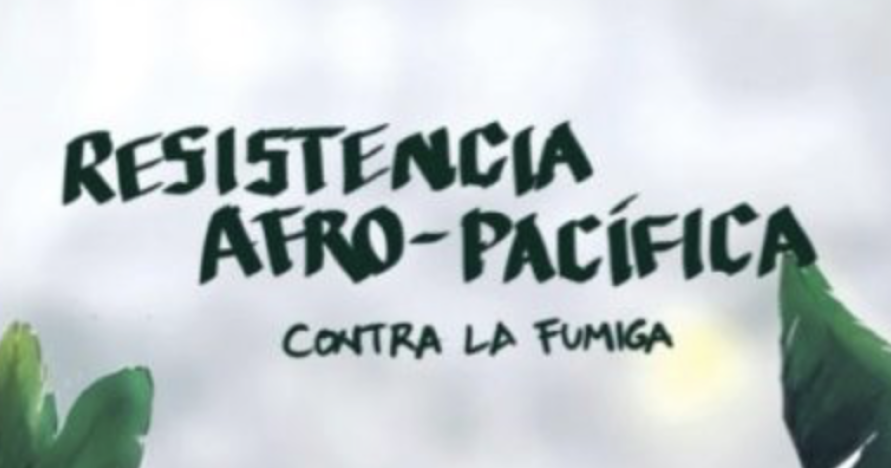
Please join us next Monday on Zoom, Nov 24, 3pm to 5pm PST / 6pm to 8pm EST / 6pm to 8pm hora en Colombia for Afro Pacific Resistance Against Pesticides, a graphic narrative manuscript workshop featuring the author, the artist, and two guest readers.
This event is streamed via Zoom for remote participation.
Click here to join the Zoom room.
Meeting ID: 948 8364 7272
Psw: 063464
Evento en español – Event in Spanish
A graphic narrative manuscript workshop with the author and the artist
In the ethno-graphic novel, Resistencia afro-pacífica contra la fumiga (Afro-Pacific Resistance Against Fumigation), Alexander Huezo narrates 15+ years of fieldwork in the Colombian Pacific, a landscape inscribed by violence and the environmental racism of the US-backed war on drugs. He interviews people from rural communities who are both impacted by the demand for coca (to be processed into cocaine) as well the aerial fumigation of coca, the most prevalent war on drugs strategy to limit its supply. Alexander also meets with US and Colombian officials in charge of carrying out this punitive strategy, revealing the disparity between the communities’ perspectives and the solutions imposed by outside authorities. Resistencia afro-pacífica contra la fumiga thinks through these disparities through a global environmental justice framework, while also reflecting on the intentions and ethics of the ethnographer.
Details about featured speakers:
Alexander Huezo
Alexander Huezo is an assistant professor in the Department of Global and International Studies at the University of California, Irvine. His research investigates the transnational and more-than-human dimensions of racism and environmental justice. In particular, he studies how Afro-Colombian communities in the Pacific region of Colombia resist the war on drugs, amongst other socio-environmental crises. Alexander’s research has been funded by the Social Science Research Council, the Fulbright US Scholar program and several institutional grants. His publications include Visions of Global Environmental Justice (University of California Press, 2025) and articles in academic journals such as World Development and the Journal of Political Ecology.
Jose E. Arboleda
Jose –who earned a Master of Fine Arts from the Institute of Fine Arts, and Multimedia Design Technologies in Cali, Colombia— is trained in the design and layout of illustrated books. He has led workshops on graphic narratives and audiovisual production in Colombia and abroad, such as the TorinoFilmLab (Italy). Jose collaborated with Alexander Huezo to illustrate the book Visions of Global Environmental Justice (University of California Press, 2025). He is currently developing the graphic adaptation of Surgery and Salvation: The Roots of Reproductive Injustice in Mexico (17740 – 1940) (University of California Press, 2025), co-authored with historian Elizabeth O’Brien.
Liseth Espíndola Ramírez
Liseth is currently a doctoral candidate in the Department of Hispanic Studies at the University of California, Riverside. Her research focuses on alternative representations of violence in nineteenth- and twentieth-century Colombia, particularly through the work of contemporary Colombian women writers. She proposes a dialogue between literary voices and the residual, often-silenced voices of women found in institutional archives. By bringing these two sources into conversation, she seeks to rethink the very criteria that define what is recognized as memory and history. Her work examines how literature opens a space to engage a past that has not yet been fully produced but can nevertheless be perceived through a critical rereading of the archive.
Johanna Nieto
Johanna Nieto is a researcher and Arts & Cultural manager, co-founder of Río Junto, a Latin American cultural collective. She holds an M.A. in Cultural Management from the Jorge Tadeo Lozano University in Bogotá and a B.A. in Political Science from the National University of Colombia. She is currently a Ph.D. candidate in the Department of Hispanic Studies at the University of California, Riverside (UCR), with designated emphasis Archives, Museums, Manuscripts & Print Studies. Her research examines the role of cultural practices in building environments of care within communities subjected to violence, drawing from her experience working with artists and Indigenous and Afro-Colombian women affected by the armed conflict. Through a collaborative and decolonial approach, Johanna aims to highlight and strengthen these cultural practices as tools for resilience, repair, and resistance in vulnerable territories.
